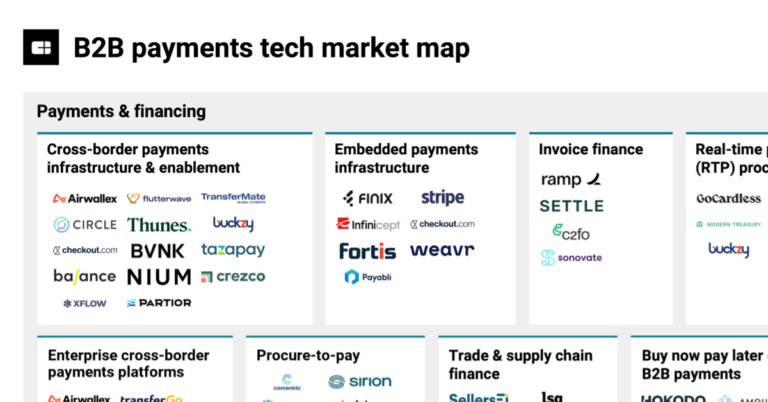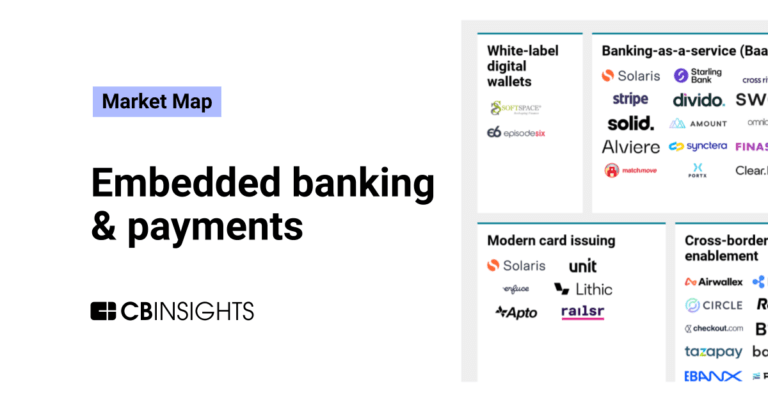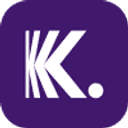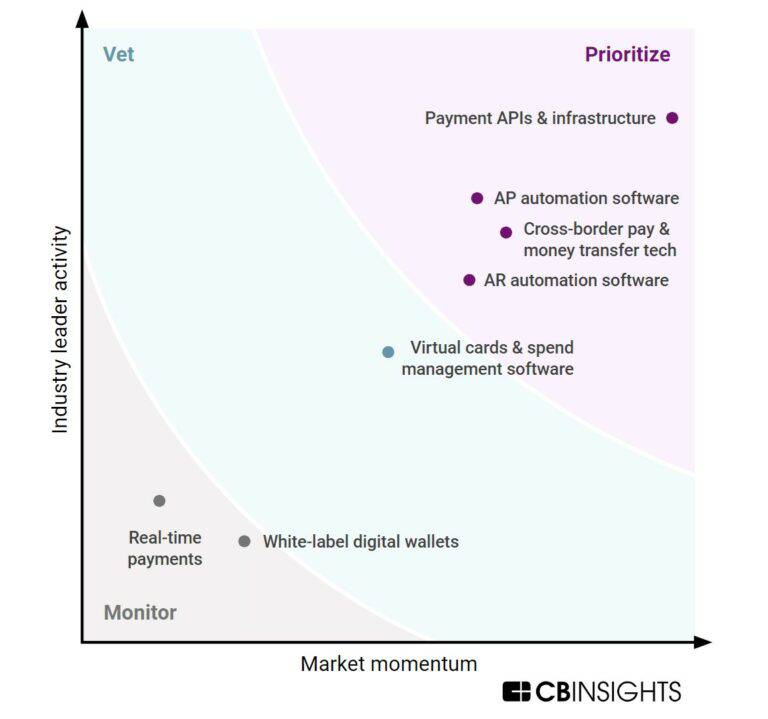
Chipper Cash
Founded Year
2018Stage
Debt | AliveTotal Raised
$341.58MValuation
$0000Last Raised
$3.98M | 2 yrs agoRevenue
$0000Mosaic Score The Mosaic Score is an algorithm that measures the overall financial health and market potential of private companies.
-6 points in the past 30 days
About Chipper Cash
Chipper Cash is a financial technology company that specializes in enabling cross-border payments and financial inclusivity in Africa. The company offers services such as mobile money transfers, digital payment cards, personal and business investment platforms, and artificial intelligence-led identity verification. It was founded in 2018 and is based in San Francisco, California.
Loading...
Loading...
Research containing Chipper Cash
Get data-driven expert analysis from the CB Insights Intelligence Unit.
CB Insights Intelligence Analysts have mentioned Chipper Cash in 4 CB Insights research briefs, most recently on Aug 23, 2024.

Aug 23, 2024
The B2B payments tech market map
May 8, 2024
The embedded banking & payments market mapExpert Collections containing Chipper Cash
Expert Collections are analyst-curated lists that highlight the companies you need to know in the most important technology spaces.
Chipper Cash is included in 6 Expert Collections, including Unicorns- Billion Dollar Startups.
Unicorns- Billion Dollar Startups
1,270 items
Payments
3,136 items
Companies in this collection provide technology that enables consumers and businesses to pay, collect, automate, and settle transfers of currency, both online and at the physical point-of-sale.
Fintech
9,466 items
Companies and startups in this collection provide technology to streamline, improve, and transform financial services, products, and operations for individuals and businesses.
Fintech 100
499 items
250 of the most promising private companies applying a mix of software and technology to transform the financial services industry.
E-Commerce
217 items
Silicon Valley Bank's Fintech Network
88 items
We mapped out some of SVB's biggest clients, partnerships, and sectors that it serves using CB Insights’ business relationship data from SVB’s profile to uncover just how important it is to the fintech universe. The list is not exhaustive.
Latest Chipper Cash News
Apr 7, 2025
Image: NGX When Flutterwave, Africa’s fintech darling, first hinted at going public, all eyes turned to the usual suspects: New York, London, and notably not Lagos. Why is it that even the continent’s brightest stars often look outside their borders to go public? E-commerce giant Jumia and Egyptian mobility startup SWVL Holding are among African startups that pursued foreign listings, but later experienced the unforgiving nature of those markets. The belief that a thriving IPO market is the gold standard of financial maturity has long shaped how we assess Africa’s capital markets. But this lens often overlooks the continent’s unique realities—and in some cases, it stunts the creative evolution of more suitable models. So, what’s really holding back African securities exchanges? And more importantly, what futures could we be building instead? Are IPOs alone the answer? According to the African Securities Exchanges Association (ASEA), only fourteen IPOs took place across Africa in 2023, raising just $1.3 billion. That figure pales compared to emerging economies like India, which saw 57 IPOs raising over $7 billion in the same period. The Nigerian Stock Exchange (NGX) has listed only a few new companies in the past decade. Over at the Nairobi Securities Exchange (NSE), the bourse has suffered an IPO drought, with Safaricom being the last significant listing 17 years ago. The inactivity at NSE is despite major tech success stories in Kenya. Although the Johannesburg Stock Exchange (JSE) is Africa’s most prominent, it has seen more delistings than listings in recent years. In the past two years alone, the JSE had around 12 delistings, with just three new listings. Next Wave continues after this ad. StroWallet lets your customers pay you directly. Access USD Virtual Cards, Virtual Accounts, ATM Cards, POS terminals, and Bill Payment APIs to manage your finances and grow your business with ease. It doesn’t mean the exchanges are dormant; more innovation from regulators, telcos, and fintech could spur interest, just like mobile money revolutionised banking on the continent. African companies, particularly in tech and high-growth sectors, are opting for alternative capital. Private equity, venture capital, and acquisitions could offer local firms more scalable and reliable options. The African Private Equity and Venture Capital Association (AVCA) data show that over 450 private capital deals were signed in 2023, totaling $7.2 billion in disclosed value. These investments include early-stage startups and mature companies, many of which now prefer to stay private or exit through M&A rather than IPOs. There are several examples to consider. Andela, the tech talent accelerator that started in Nigeria, opted for a US-based structure and raised over $180 million before hitting unicorn status. Yoco, the South African fintech company, raised $83 million in its Series C round and continues to expand privately. The capital markets are not dormant in many ways—they’re just evolving beyond their traditional forms. Over 30 exchanges! Like other sectors, fragmentation is another critical factor limiting the role of African exchanges. With over 30 independent stock exchanges across the continent, capital and expertise are stretched. From Lagos to Johannesburg, Nairobi to Casablanca, African exchanges have limited liquidity, small investor bases, and an unfriendly regulatory climate. The lack of integration of major bourses has created barriers to scale and discouraged foreign and regional investment. However, efforts to reverse some of this damage are gaining momentum. The ASEA and African Development Bank-backed African Exchanges Linkage Project (AELP) is pushing for cross-border trading between key exchanges, including South Africa, Kenya, Nigeria, Morocco, and Egypt. The project will enable investors in one market to buy securities listed in another. In East Africa, the East African Community (EAC) Capital Markets Infrastructure Project is implementing a unified trading and clearing platform that will cover all the member countries. It could create a harmonized market of over 185 million people if successful. Francophone West Africa offers a living example of what exchange integration could look like. Abidjan-based Bourse Regionale des Valeurs Mobilieres (BRVM) serves eight countries. Despite the challenges that individual economies like Burkina Faso, Mali, or Niger face, the platform has created efficiencies of scale and outperformed other exchanges. In 2023, BRVM surpassed its Anglophone counterparts, with its composite index– a weighted equity index that tracks the performance of the largest listed companies– rising by 13.5%. Capital markets could follow suit as more regional economic blocs pursue monetary and fiscal integration. Tech as a leapfrog mechanism The next generation of African exchanges may not look like traditional trading floors. They might be mobile-first, blockchain-enabled, and run on AI-powered models. Platforms like Chipper Cash, Hisa, Bamboo, and Trove already give retail investors access to U.S. stocks from African soil. What if the same tech stack also enabled fractional ownership of local enterprises? In 2024, Nigeria’s Trove began piloting fractional trading of local stocks–allowing users to invest with as little as 500 naira ($0.50). Micro-investing could open the doors to millions of small investors currently shut out of the capital market. In Kenya, for instance, the government’s M-Akiba allowed ordinary citizens to buy government securities through mobile money platform M-Pesa, raising over KES1 billion from first-time investors. Such platforms prove that with the right tech and user experience, participation in securities markets can be democratized. Tokenised securities, smart contracts, and mobile KYC can bypass the red tape that bogs down IPO processes. It could allow local SMEs and startups to raise funds without needing full-fledged listings, bringing liquidity and trust to underserved sectors. Blockchain technology could also reshape the infrastructure of African markets. In South Africa, firms like Revix are offering tokenized investment products. If applied to local equity or debt markets, blockchain could reduce settlement times, improve transparency, and cut costs. Imagine small and medium enterprises issuing tokenized bonds to raise capital from a pan-African investor base—without expensive and bureaucratic IPO procedures. What needs fixing The structural challenges facing African exchanges remain. Retail participation in African markets is low compared to other regions. For instance, only 1.5 million people in Kenya–2.7% of the population–hold Central Depository System (CDS) accounts. This figure is even lower in Nigeria, where less than 0.2% of the population actively trades equities. In contrast, around 55% of Americans and 7% of Indians have active accounts in the capital markets. Education, trust, and access remain significant barriers. Next Wave continues after this ad. Registration for GITEX AFRICA 3rd edition is NOW OPEN – Africa’s largest tech and start-up event from 14-16 April, 2025 in Marrakech, Morocco. Presenting 3-days of high impact and outcome-focused public-private sector collaborative gatherings, including the largest, most advanced, tech innovation showcases. Wild swings of local currencies like the naira discourage foreign investors. In 2023, Nigeria floated the naira, which led to a 40% devaluation, which saw some foreign investors exit the NGX. The regulatory environment, even in some of the most advanced economies on the continent, presents hurdles. South Africa, it is estimated that the total cost of going public exceeds $200,000, which is unaffordable for most African startups or mid-sized firms. Instead of replicating Wall Street or the London Stock Exchange, African countries should design capital markets that respond to their unique economic realities. One such solution is testing tiered exchanges that cater to businesses at different levels of growth. Kenya’s efforts to achieve this through the Growth Enterprise Market Segment (GEMS) was a step in the right direction but failed to attract enough interest due to red tape and limited investor appetite. A more flexible, tech-enabled version—combined with mentorship, investor education, and tax incentives—could be more effective. An active capital market could boost retail participation. This must become a national priority. Like mobile money and banking, African exchanges can work with telcos and fintechs like Bamboo and Hisa to make trading as easy as sending money. M-Akiba’s success shows that ordinary people are willing to invest when given the chance. Regulations must evolve to support these innovations, particularly mobile KYC and investor protection. To address forex risk, regional exchanges might explore dual-currency listing options and settlement in digital regional currencies under regional trade agreements like the AfCFTA. Meanwhile, better exit strategies, including active secondary markets and partnerships with development finance institutions, can support private equity and venture capital ecosystems. The success of Africa’s capital markets shouldn’t be measured just by the number of IPOs. Success could just as well be measured by how many businesses raise funds to grow, how many jobs are created, or how many ordinary citizens are able to participate in wealth creation. It’s about inclusion, innovation, and impact—not simply imitation. Adonijah Ndege Senior Reporter, TechCabal Thank you for reading this far. Feel free to email adonijah[at]bigcabal.com, with your thoughts about this edition of NextWave. Or just click reply to share your thoughts and feedback. We’d love to hear from you Psst! Down here! Thanks for reading today’s Next Wave. Please share. Or subscribe if someone shared it to you here for free to get fresh perspectives on the progress of digital innovation in Africa every Sunday. As always feel free to email a reply or response to this essay. I enjoy reading those emails a lot. TC Daily newsletter is out daily (Mon – Fri) brief of all the technology and business stories you need to know. Get it in your inbox each weekday at 7 AM (WAT). Follow TechCabal on Twitter, Instagram, Facebook, and LinkedIn to stay engaged in our real-time conversations on tech and innovation in Africa. If you liked this edition of Next Wave, please share with your friends. And feel free to reply with thoughts and feedback. We welcome those. 18, Nnobi Street, Surulere, Lagos, Nigeria
Chipper Cash Frequently Asked Questions (FAQ)
When was Chipper Cash founded?
Chipper Cash was founded in 2018.
Where is Chipper Cash's headquarters?
Chipper Cash's headquarters is located at 180 Montgomery Street, San Francisco.
What is Chipper Cash's latest funding round?
Chipper Cash's latest funding round is Debt.
How much did Chipper Cash raise?
Chipper Cash raised a total of $341.58M.
Who are the investors of Chipper Cash?
Investors of Chipper Cash include FTX, Deciens Capital, Ribbit Capital, Bezos Expeditions, Tribe Capital and 16 more.
Who are Chipper Cash's competitors?
Competitors of Chipper Cash include Zepz, LemFi, Yellow Card, Eversend, FairMoney and 7 more.
Loading...
Compare Chipper Cash to Competitors

Kuda operates in the financial services sector. The company offers a range of services, including money transfers, savings and investment options, and credit facilities such as overdrafts and term loans. Kuda primarily serves individuals and businesses, providing solutions for personal finance management and business operations. Kuda was formerly known as Kudimoney Bank. It was founded in 2018 and is based in Lagos, Nigeria.

Opay is a digital payment platform that provides financial services. The company allows fund transfers, cashback on airtime and data top-ups, and has a savings account with daily interest. Opay provides a debit card that can be used for online transactions and offers customer service support. It was founded in 2018 and is based in Lagos, Nigeria.

Eversend is a financial technology company that provides a multi-currency e-wallet for currency exchange and enables users to send and receive money globally. The company offers virtual USD debit cards and serves individual consumers and business owners with services related to financial transactions and currency management. It was founded in 2019 and is based in London, England.

Interswitch is a company that operates in the electronic payment and digital commerce solutions sector. The company provides services including payment processing and transaction switching, as well as digital payment products for individuals, SMEs, and large corporations. Interswitch's solutions are used across different industries to facilitate transactions and business operations. It was founded in 2002 and is based in Lagos, Nigeria.

Flutterwave operates as a financial technology company. It provides a variety of payment solutions, including online payment acceptance, cross-border payouts and transfers, currency swaps, and point-of-sale (POS) systems. It primarily serves businesses, individuals, and startups, particularly in emerging markets. The company was founded in 2016 and is based in San Francisco, California.

PalmPay develops a secure, digital payment experience in an effort to promote financial inclusion and enhance consumer experiences. The company improves its users' digital payment experiences by offering financial account creation, money transfers, bill payments, and instant access to credit services. It was founded in 2019 and is based in Lagos, Nigeria.
Loading...


